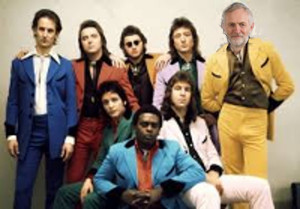Three Steps to Corbyn

By Saturday this frivolous post might be irrelevant. But if Jeremy Corbyn wins Labour’s leadership election; well…
…listen, and you will plainly see. Dooo, wap wap, dooooooo.
So it goes like this. You have been a MP since 1983, representing the London constituency of Islington. You are of the outspoken, own-person persuasion. You are seen as a traditional socialist, and your economic and monetary policy has been called “Corbynomics”. And on hundreds of occasions you have voted against your own party in parliament. Then you seem to casually mention you might want to be leader. As Showaddywaddy might not have put it, or even Eddy Cochrane: There are three steps to Corbyn.
Step 1: You find someone to nominate you
Actually under Labour’s rules, a leadership candidate requires 15% of MPs to nominate them. So, with 232 MPs, that means 35 nominations to get onto the ballot. That might not sound too difficult, and for two, perhaps three of the candidates it wasn’t. But Jeremy Corbyn struggled to find 35 MPs to back him. In the end, a small number of MPs decided to give him their support, ostensibly to widen the field of candidates. Margaret Beckett was one senior MP who did just that, never really expecting Jeremy to be so popular. She now considers her action to be that of a “moron” because “”At no point did I intend to vote for Jeremy myself – nice as he is – nor advise anyone else to do it,”.
So Jeremy got his 35 nominations and his name went forward as one of four in the “wide field of candidates”. The other three candidates; Yvette Coooper, Andy Burnham and Liz Kendall, appear to have fairly similar qualities when compared with Jeremy, but no doubt if the contest was restricted to those three then the differences would have emerged. Many Labour party members consider Liz Kendall to be on the right of the party much like Tony Blair was. Indeed she is often called a “Tory”, which is meant as an insult.
The subsequent campaigning has seen Jeremy Corbyn’s odds at the bookies move from longer than 100/1 to being odds on favourite. Although he finds little favour among MPs, he appeals to a majority of the membership, and it is they who get to decide. Move on to step 2.
Step 2: They fall in love with you
So now you’re just about to be elected leader. You will, in fact, find out in less that two days time. But there’s a fair wind and let’s say you’re chosen. You may even have got 50% at the first round, not requiring second or third choices to be counted from eliminated candidates. Not that they will do you much good given their covert ABC – anyone but Corbyn – campaign.
Jeremy’s next task would then be to lead Labour MPs in parliament, as Her Majesty’s Leader of the Opposition. Given that fewer than 15% of them voted for Jeremy, that might be a troublesome task. There has been talk of some senior MPs refusing to work under Jeremy and even talk of a breakaway party. But Jeremy will have enough people, perhaps the young and hungry, to fill the various Shadow Cabinet posts.
If those pesky MPs haven’t somehow managed to shunt Jeremy out of his job in the next four years, a general election will be along soon. Time for step 3.
Step 3: You win the election outright(ly)
Everyone in 2015 said that Labour won’t get into power in 2020, especially with Jeremy Corbyn as leader. Well, people have had enough of the recession. The Conservative party is running a minority government having lost a few by-elections and since David Cameron stepped down as leader, old feuds between the traditional right and the one nation centrists have led the public to lose faith in them and there’s a desire to try something different. Someone different. Step forward Prime Minister Jeremy Corbyn, with 100 new MPs mostly subscribing to his brand of politics.
The first budget includes tax rises for the better off – 50% for those earning more than £100,000 and an indication that a new band of 60% will be introduced before long, perhaps on bonuses. Corporation tax also rises, even more so for banks, but benefits go up, with many of the caps put on over the previous ten years rolled back. A new bank is to be established to invest in infrastructure and new technology, funded by quantitative easing (printing money). Borrowing will temporarily increase too, but as there will be economic growth, any budget deficit arising (George Osborne managed to eliminate it just last year) from that borrowing will soon be closed and turned into a surplus.
At the State Opening of Parliament, bills before the Commons are to include: nationalising the railways and electricity generating companies; the conversion of all remaining grammar schools to comprehensives; schools with academy status to come back under local authority control; nuclear weapons to be decommissioned alongside discussions with NATO about the UK’s future part in the treaty; a programme of public sector housebuilding for both residents and immigrants; and the removal of tuition fees for students.
Not all of that will be accomplished in one year for a number of reasons, but it will be the start of an uncharted course for the UK, with the knowledge that if it’s not a success then Jeremy’s time as Prime Minister might be very short indeed. But if successful, it would mark the biggest shift in UK politics since Margaret Thatcher’s neoliberal reforms which began in 1979.
And as we look back to the 1970s
When the UK had a socialist government the last time (we don’t count Tony Blair’s Labour), we might recall some of the music that we used to listen to.







